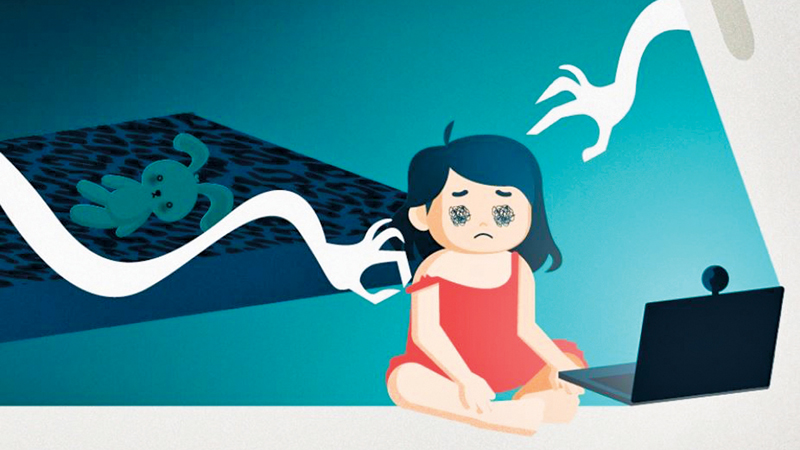Social media has become a primary part of contemporary societies, shaping how people communicate, connect, and share information. There is no doubt the absolute necessity of social media due to its ease of accessibility and ability to stay updated with all the new information in the world.
 Yet, the irony is that while it offers numerous benefits, the use of social media also presents critical challenges. Some of them can have a direct, harmful impact on society. Facilitation of child abuse and exploitation is one such negative area that must be addressed promptly, accurately, and intensely.
Yet, the irony is that while it offers numerous benefits, the use of social media also presents critical challenges. Some of them can have a direct, harmful impact on society. Facilitation of child abuse and exploitation is one such negative area that must be addressed promptly, accurately, and intensely.
At this point in time, online sexual exploitation of children has become a global emergency that has drawn the attention of all major institutions throughout the world, including the United Nations.
In Sri Lanka, predominantly due to the heavy online usage that occurred during the Covid-19 period for educational purposes, children seem to have spent longer periods online than ever before. This is a serious concern for Sri Lankan society that must be addressed sooner rather than later.
According to the National Child Protection Authority (NCPA), a total of 9,434 complaints related to child abuse, of which many were received through social media, were received from the beginning of January to the end of December last year. This figure is spiking year after year. Considering the population of the country, this figure is staggeringly high. Creating more concerns, the police said that 1,077 complaints related to incidents of abuse, violence, and harassment against women and children were recorded from January 4 to March 10, 2024.
Child exploitation through social media comprises various forms, including grooming, online harassment, sexual solicitation, and child sexual abuse material. Offenders use social media platforms to establish relationships with children, manipulate them, and force them into harmful situations.
Benefits and opportunities
Growing up online provides many benefits and opportunities. Through online tools such as computers, smartphones, gaming consoles, and televisions, children learn, imagine, and develop their social networks. When it is used in the right way, online usage has great potential to broaden knowledge and enhance the creativity of children.
Nevertheless, if social media is applied in the wrong manner, the harm inflicted on children can be devastating and disturbing. Often, exploitation through social media will have a lifelong impact on those who are victimised. There is no doubt that youth fancy social media—and so do predators. Social media enables the two to interact, with awful consequences for children who will end up physically or mentally exploited.
When children embrace digital platforms, they may unknowingly succumb to perpetrators and be victimised through the production, distribution, and consumption of sexual abuse material. The exploiters may attempt to groom them for sexual exploitation.
There are several forms of abuse, such as grooming, sextortion, and cyberbullying, that prevail in the country. Grooming involves building trust and emotional relationships with a child to prepare them for sexual abuse or exploitation. Perpetrators use social media platforms to initiate contact, subtly lure them into intimate conversations, and gradually escalate to more explicit or intimidating interactions.
Sextortion refers to the coercion of children into providing sexually explicit images or videos, often through threats, blackmail, or manipulation. In some cases, criminals groom children to send them sexually explicit images and then threaten to post those images publicly unless the child provides them with more.
Perpetrators leverage social media to exploit vulnerabilities, manipulate victims into sharing sensitive content, and then use it to extort financial or sexual favours. They use chat rooms and news feeds to develop relationships with their intended victims. Before long, the victims are coerced to supply intimate and compromising images.
According to the media, cyberbullying is becoming another major social issue emerging with social media platforms. Cyberbullying encompasses harassment, intimidation, or humiliation of children through online platforms, including social media and messaging apps, and at times gaming communities. Offenders use anonymity and the viral nature of social media to target victims, amplify the impact of their actions, and inflict harm.
Abuse through social media can have profound and long-lasting psychological effects on victims, including anxiety, depression, Post-Traumatic Stress Disorder (PTSD), and suicidal imagination. The digital permanence of online abuse can inflict feelings of shame, isolation, and helplessness, making it difficult for victims to seek help or disclose their experiences.
Penal code
Currently, there are several acts, laws, and regulations that exist to prevent child abuse in Sri Lanka. Prevention of Domestic Violence Act No. 34 of 2005, provisions in the penal code such as Sections 308–314, cover offences related to sexual abuse and exploitation of children, such as child molestation, child pornography, and statutory rape, and Section 305 deals with cruelty. In addition, the Children and Young Persons Ordinance No. 48 of 1939 and the National Child Protection Authority (NCPA) Act No. 50 of 1998 are in effect as legal frameworks in Sri Lanka.
However, the most conspicuous major drawback is the prevailing undue delays in the judicial system due to multiple reasons. Despite various attempts over the past several decades to speed up legal procedures, the delivery of justice remains slow. The Parliament recently passed the Online Safety Bill, but the accurate result can be seen only in a few months. The legal framework surrounding child abuse can be effective only if it can be enforced decisively by law enforcement agencies.
In this setting, parents have a major role to play as, possibly, they are the first to detect behavioural changes in a child. Parents must educate children on how to navigate safely, be aware of any dangers they may encounter, know what things to look out for, and pinpoint red flags. However, even if they educate children on how to safely engage with social media platforms, the risk of exploitation is always a reality. Offenders have ways and means to cover their tracks and to evade detection.
However, it is common knowledge that parenting is now more difficult than it was 10 years ago, with technology and social media as the top two cited reasons. While almost all parents believe they have a responsibility to protect their children from inappropriate and harmful content online, the entire burden of mitigating the risk of harm from social media cannot be placed on the shoulders of children and parents. The social media service providers, law enforcement agencies, judiciary, and policymakers also must be held responsible.
Raise awareness
In order to effectively prevent online exploitation, creating public awareness and providing information to educate people, particularly parents, is crucially important. Implementing nationwide campaigns to raise awareness about the prevalence and consequences of child abuse is important. Providing educational programs in schools, communities, and healthcare settings to empower children, parents, and the general public is pivotal for prevention and early intervention.
Technology companies play a central role and have a fundamental responsibility in designing safe online environments and in preventing, minimising, and addressing the risks associated with social media. Although they have systems to monitor and remove inappropriate content, the perpetrators have established methods to go around such preventive measures.
The authorities should enact more effective legislation and regulatory frameworks to hold social media platforms accountable for safeguarding children’s rights and ensuring a safe online environment. The Government must establish user-friendly reporting mechanisms and support services for victims of online abuse to ensure prompt and effective interventions and access to specialised care and support.
In Sri Lanka, despite significant attempts in recent years, online child abuse remains a common concern, encompassing various forms such as physical, sexual, emotional, and neglect. Preventing and addressing child abuse in Sri Lanka requires a concerted effort involving government agencies, civil society, communities, and individuals.
The introduction of combined preventive measures, intervention strategies, and collaborative partnerships can create a safer and more nurturing environment for children, safeguarding their rights and ensuring their well-being for generations to come.







